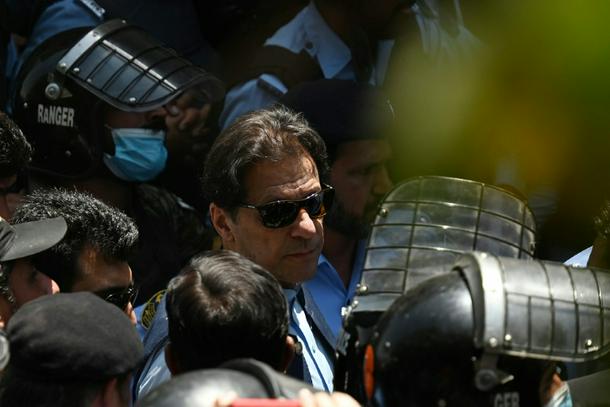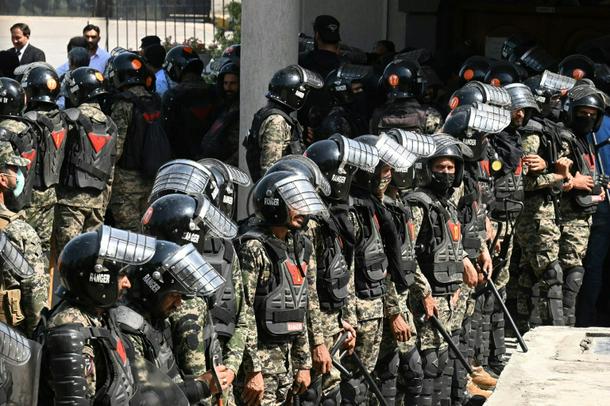
Former Pakistan prime minister Imran Khan has become entangled in a slew of legal allegations
Lahore (Pakistan) (AFP) - Pakistan’s former prime minister Imran Khan returned home on Saturday after his arrest sparked days of clashes between his supporters and security forces was declared unlawful.
The one-time cricket superstar – who has been tied up in dozens of legal cases since being ousted from power in April last year – was freed on bail and granted protection from further arrests until Monday.
Enraged by his detention, supporters set fire to government buildings, blocked roads and damaged property belonging to the military which they blame for Khan’s downfall.
“The head of the country’s largest party was abducted, kidnapped from the high court, and in front of the entire nation,” Khan told AFP from the Islamabad High Court after being freed.
“They treated me like a terrorist, this had to have a reaction,” he said of the protests that followed.

Paramilitary soldiers cordoned off an area of the high court during Imran Khan's hearing on May 12
Khan has repeatedly clashed with Pakistan’s powerful military since being booted from power last April in a no-confidence vote, and told reporters that “one man, the army chief” was behind his arrest.
Prime Minister Shehbaz Sharif, the head of a shaky coalition, on Saturday warned that those involved in “facilitating, abetting and perpetrating” the violence should be arrested within 72 hours.
“Those who demonstrated anti-state behaviour will be arrested and tried in anti-terrorist courts,” he said during a visit to Lahore.
At least 10 people from PTI’s senior leadership have been arrested since the protests began, one of Khan’s lawyers said.
Interior minister Rana Sanaullah has repeatedly vowed that police will rearrest Khan, who remains wildly popular ahead of elections due in the Autumn.
The country now seems primed for a “progressively ugly showdown in the days and weeks to come”, read an editorial in Dawn, the country’s leading English language newspaper.
“None of the leaders, political or institutional, who are invested in this tug-of-war appear ready to take a step back,” it said.
- Today is a victory -
Khan returned to his Lahore residence on Saturday where he was greeted by jubilant crowds of supporters who threw rose petals over his car.
His arrest on Tuesday came just hours after he was rebuked by the army for claiming it was involved in an assassination attempt against him last year.
Khan won power in 2018 on an anti-corruption campaign, voted in by an electorate weary of decades of dynastic politics.
Independent analysts say he was brought to power with the support of the military – who hold undue influence in Pakistan – before falling out with the generals.
“They keep trying to silence Khan and keep trying to put him behind bars. But Khan has proven that the one who stands with the truth always wins,” 21-year-old supporter Waqar Ahsan told AFP after Khan was granted bail.
Zuneira Shah, a 40-year-old mother of three, said “the establishment would keep coming for him”.
“Khan is threatening their decades of corruption so of course they will not sit still. It’s a long fight ahead, but today is a victory.”
- Thousands arrested -
At least nine people died in the unrest this week, police and hospitals have said.
Hundreds of police officers were injured and more than 4,000 people detained, mostly in Punjab and Khyber Pakhtunkhwa provinces, according to authorities.
Mobile data services and access to social media platforms including Facebook and YouTube, which were cut shortly after Khan’s arrest on Tuesday, had been partly restored around the country.
The political crisis has simmered for months, with Khan attempting to disrupt the coalition government by dissolving two local parliaments he controlled and agitating for early elections.
He has accused the government of supplanting him in cahoots with top generals, and made explosive claims that they puppeteered a November assassination attempt that saw him shot in the leg as he campaigned for snap polls.
Pakistani politicians have frequently been arrested and jailed since the country’s founding in 1947 but few have so directly challenged a military that holds significant influence over domestic politics and foreign policy and has staged three coups.